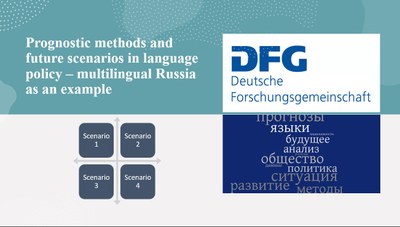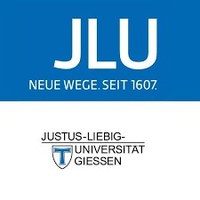Prognostic methods and future scenarios in language policy – multilingual Russia as an example
Supported by the DFG 04/2021 – 03/2024 (RFBR-DFG Cooperation: Joint German-Russian Project)
Die Kooperation mit der Partnerinstitution in Russland ist seit dem 24. Februar 2022 eingestellt.

Sociolinguistic prognostic methods and models are research desiderata since the development of language policy and planning. The joint project responds to the following gaps: the lack of awareness of theoretical and practical significance of language prognosis as an instrument of language policy and planning, the lack of fundamental research works on the prognostic problem due to its interdisciplinary nature, and the underdevelopment of concepts in the language scenario field. The lack of appropriate methods and models is reflected in the hot societal debates about the language policy management.
The research question of our joint project addresses the future of the multilingualism in the multinational Russian Federation. Its objective is to systematically explore the foundations of prognostic models and methods in selected fields of language policy. We aim to develop an interdisciplinary approach to sociolinguistic prognosis on the basis of the future scenario methodology, and, thus, to work out prognostic models and methods in language policy considering their effectiveness in regard to the language policy and language. Furthermore, we seek to demonstrate their applicability on the basis of the language situation of the Russian Federation. In doing so, we elaborate strategies and derive from the prognostic models recommendations for the language policy in the Russian Federation, a country with an unprecedented language diversity on the Eurasian continent.
The joint project uses qualitative and quantitative methods. The project corpus comprises various sources, including intensive field work in Russia’s regions.
The strategic use of prognostic models in language policy helps to develop strategies, as well as increases the productivity of the language policy measures and supports language conflict prevention. The project is of high societal relevance: the development of prognostic methods and models in the language policy of the Russian Federation, taking into account the latest research in this area and the practical experience of other countries, is important for planning public policy and effectively regulating interethnic relations in the Russian Federation.
Contact:
Justus-Liebig-Universität Gießen
Institut für Slavistik
Otto-Behaghel-Str. 10D, in 35394 Gießen
In process
-
Bitkeeva, A. / Wingender, M. (2020), Scenarii v jazykovoj politike Rossii: voprosy koncepcii i metodologii (ėlektronnyj resurs). In: Sociolingvistika , 2020, 1, 34 –53.










